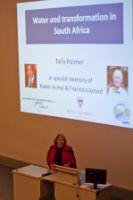
As citizens of Earth, we all live within a catchment area, and we can locate ourselves within a range of things which happen in our catchment. None of us can say that water is not our concern. Professor Carolyn Palmer, (known to everyone as Tally), opened her inaugural lecture with this stark statement at Eden Grove Blue Lecture Theatre.
Professor Palmer, whose lecture was entitled Water and Transformation in South Africa, is the Director of the Unilever Centre for Environmental Water Quality at the Institute for Water Research, Rhodes University.
She recalled a Wilderness Leadership School wilderness trail to Lake St Lucia which piqued her interest and started her on the road to her speciality of aquatic ecology. Using her inaugural lecture to briefly outline her many achievements, she described using research to transformation of South African water policy and law.
She started by explaining the River Continuum Concept, which is based on the idea that a watercourse is a connected system that is in constant interaction with the catchment, moving from source to mouth, constantly changing.
Her investigation of macro-invertebrate functional feeding groups provided a useful functional classification. Professor Palmer recalls working happily with mayflies, looking at the complexities of mouthparts and how they feed. Through her work it became evident that macro-invertebrate functional feeding groups are more complex than originally thought.
In 2005 Prof Palmer moved to Australia, where she took up the role of Director of the Institute for Water and Environmental and Resource Management at the University of Technology in Sydney. During her four years there, she was involved in continuing research into the water quality requirements of river ecosysms, linking to south African-developed research for quantifying environmental flows for rivers (This work in based on the somewhat revolutionary idea that a river might need its own water - unpolluted. Humans take and take, but how much water can a river lose and waste can it accept before it cannot continue?
On her arrival back in South Africa in 2009, she became Executive Director of Applied Research and Innovation at the National Research Foundation (NRF) and was appointed to chair the new National Water Advisory Council (NWAC) shortly thereafter.
Her work to embed balancing resource use and protection in South African policy and law involved convincing people how essential aquatic ecosystems are and what they do for us: water supply and transport, waste processing, securing biodiversity, flood control and aesthetics, among others.
However, despite hard won legal protection, there are still huge problems water resource protection and with water equity and redress in South Africa. Water quality specifically remains a burning and unresolved question.
The Unilever Centre for Environmental Water Quality has built up a capacity for research in environmental water quality, which consists of three factors: water chemistry, bio-monitoring and experimental ecotoxicology. This work has enabled the Centre to create a South African database on the response of local organisms to various toxins.
Balancing water use and resource protection is not simple. Earth comprises ‘complex social ecological systems’ which means that people and the catchments in which they live are inextricably linked.
Complex systems are not linear, and can best be addressed, says Prof Palmer, by a transdisciplinary approach using concepts such as resilience and social learning. Context in such studies is critical, as is an understanding of the history of each context.
“The transdisciplinary approach embodies coordination across all levels of disciplines,” Prof Palmer explains, and what she has learnt through a long and successful career “is that partnership is essential - you can’t go it alone.”
By Jeannie Mckeown
Photo by Desiree Schirlinger
